This web page contains the logs of S/Y Thetis’ first leg towards the Black Sea. The leg originated from Pythagorio. It proceeded from Samos, through several places in Turkey (Kusadasi, Gökkavar Limani, Çesme, Eskifoça, Bademli, Dikili), and ended in Mitilini in the Greek island of Lesvos. The logs are illustrated with maps and photographs, and also include some historical and geographical descriptions of the places visited as well as several links to other related web sites.
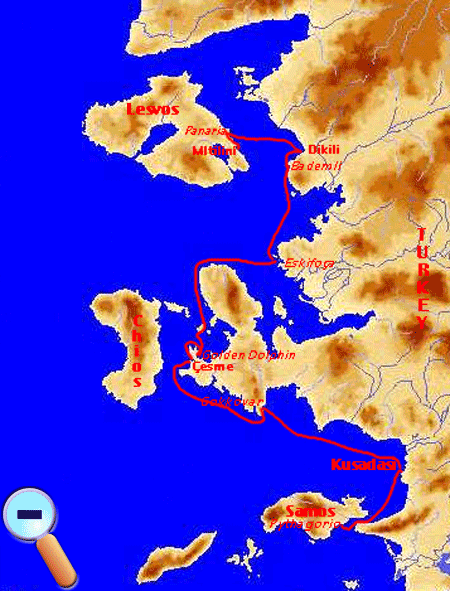
Accompanying me on this leg were my oldest daughter Cynthia Riginos, who was finishing her Ph.D. in evolutionary biology at the University of Arizona, and her husband Scott Shomer, a hydrologist. The plan was to sail along the Turkish coast to Ayvalik where on July 19, there will be a change of crew: Cynthia and Scott will take a ferry to Lesvos and Mary and Manos Castrinakis will embark.
On arrival to Samos Thetis was in excellent shape and the only remaining problems were:
- Magnetic compass
- Wind generator
- Zodiac floor
The wind generator did not work at all during the last season, so last fall I took it back to the US and sent it to the manufacturer, Air Marine in Arizona for repairs. I had it installed it in May, but it still did not work. During the past 3 weeks I had an electrician in Samos replace the wind generator wires through its mounting post. Indeed they were not well-connected. I also called West Marine and ordered a new magnetic compass which Cynthia and Scott brought to Samos. I installed it, but missing from its box were the two small compensating magnets that are used to minimize magnetic deviation. Without them the deviation is almost 7 degrees. I also asked my brother Byron to find me a rod for the zodiac floor, but he was not able to do so, so this problem was not solved. It is annoying but hardly serious.
I had exchanged e-mail and voice mail messages with my Turkish friend Turgut Ayker who lives in Izmir and keeps his sailboat New Life in Çesme and we arranged to get together there, even if only for a short time.
Tuesday July 13, 1999, Day 1
The big day has finally arrived. We are on our way to the Black Sea. Thetis is as ready as she can possibly be. She is full of spare parts and supplies, including fruits and vegetables from Kalami and 14 bottles of Samian ouzo for special gifts to people in Turkey. The only problem was with her skipper’s throat. I had a terrible sore throat for several days which, combined with the heat, had made sleeping difficult. So here we were starting on the adventure on Tuesday the 13th which is the Greek equivalent of Friday the 13th, the least auspicious day. In addition, the weather reports were not too good: there were gale warnings for the Kafireas Strait (between the islands of Evia and Andros), and for the Karpathos Sea.
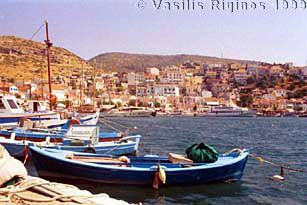
We took a taxi from Kalami and by 9:15 we were at Pythagorio (Πυθαγόρειο) harbor where Thetis was waiting. While Cynthia and Scott were doing some last minute shopping I undertook the formalities for clearing us out of Greece. This task turned out to be much easier said than done. My friends at the Limenarchio-Λιμεναρχείο (Greek Coast Guard) informed me that I had to first visit the police and have our passports stamped, then customs. Each of these authorities will issue a paper which I then was to bring to the Limenarchio. Based on these papers, the Limenarchio will give the permission to sail: the apoplous. The customs office is right next to the Limenarchio, but the police is at some distance. The day, despite the brisk wind (25 knots), was very hot. I walked to the police office but the one and only officer who was authorized to check and stamp passports was absent. I waited for over 20 minutes but there was no sign of him. After some agitation I was told that he was most likely at the end of the harbor clearing in or out a tourist boat. There was, of course, no way to verify this by phone and I had to walk for about 10 minutes under the hot sun to the end of the harbor. There was no tourist boat and the police kiosk was deserted. Another 10 minute walk back to the station. At about one block before the station, I noticed a uniformed policeman carrying a large brief case and a cardboard box. On a hunch, I asked him if he was the passport officer. He was. So we both went to the station. He produced some forms for me to sign and asked for two copies of the crew list. I had prepared these on the computer so I was ready. He asked me to sign them, then he took these plus our three passports and went away to “check them.” He was gone for over 40 minutes. When he finally came back he told me that my Greek passport was defective. This was a brand new passport issued to me by the Greek consulate in Washington, D.C. The defect consisted of a plastic laminate not being straight. I explained that I have no control on laminates issued by another branch of his government. After some argument I convinced him that I was a respectable citizen and not a forger and he produced the almighty stamp and with a bang stamped all three passports plus a scrap of paper for the Limenarchio.

Thinking that my travails were over, I walked to the customs office. It was hermetically shut! They told me at the Limenarchio that the customs man most likely was at the end of the harbor clearing in or out a tourist boat. So, another ten minute walk back to the end of the harbor. This time, however, there was a tourist boat and the customs man was aboard. He promised to be back at his office within ten minutes. Back I walked under the blistering sun. Scott and Cynthia were wisely sipping cool drinks at a cafe and I joined them while waiting for the man. After another ten minutes he did show up, unlocked his office, and asked for a crew list. He also asked for a list of major equipment. He stamped all the lists, and issued the clearance paper. He told me that I should hold on to the stamped equipment list to be used when we re-enter Greece. Armed with these papers, I walked into the Limenarchio where all I had to do was to give another crew-list, the paper from the police, the paper from customs, and pay the harbor dues for the past three weeks. They were an amazingly low 6,000 GRD (~ $20). Later I noticed that in computing the dues they used for the length of Thetis as 10.65 ft instead of 10.65 meters. Finally, I paid Mr. Demetris, the new harbor attendant, for the electricity connection. This was a new feature this year.
By 1140 we were ready and we cast off our lines and raised the anchor. No problems, which is unusual for Pythagorio where fouled anchors are the norm. We had just left the harbor when to our great surprise, the cellular phone started chirping. It was my friend Turgut from Izmir. He wanted to make sure that we will go to the Golden Marina in Çesme, where he keeps his boat, and that we can spend the day with him. He wants to drive us around, show us the area, and then take us out to dinner. I promised to call him the day before arriving.
The wind was fairly strong gusting to 29 knots but the sea in the Samos Channel was relatively calm. After we cleared the channel, the wind diminished somewhat in strength to about 20 knots NW and we were able sail for a while with both sails. I left the main on its 1st reef as I was too tired by the formalities to shake it. After an hour or so of sailing, the wind died out to 8 knots. We lowered the main, put up the tent, and started the motor. It was very hot. There were rolling waves and they made Scott a little upset. We stopped for a few minutes and we all jumped into the water to cool off.
About 1 M from the Kusadasi Marina, we hailed them at the designated VHF channel 73. They responded, and informed us that they were expecting us. We arrived in Kusadasi [37° 52' N 027° 15' E] at 1520 having covered a distance of 20.5 M. We were met at the marina entrance by an attendant in an inflatable who directed us to a berth attended by another attendant. Within a few minutes we were handed a mooring line and our stern lines were tied. A more formally dressed attendant arrived, wearing a Setur uniform — the marina has recently been purchased by the Setur company, quite an improvement from the old government run outfit. He immediately asked if we were Mr. Ayker’s friends. He then gave us a gift-wrapped bottle of wine and a welcoming card, complements of the marina management. He informed me we were guests of Mr. Ayker and that all our expenses were covered. This is Turkish hospitality! He came aboard, after removing his shoes, and very efficiently, took our passports, ship papers, asked a few pertinent questions in excellent English, while filling the customs forms, took $45 for Scott’s visa (Cynthia and I with Greek passports did not need a visa), and left with his motor scooter. The heat was excruciating. We could hardly think.
|
The Kusadasi Marina |
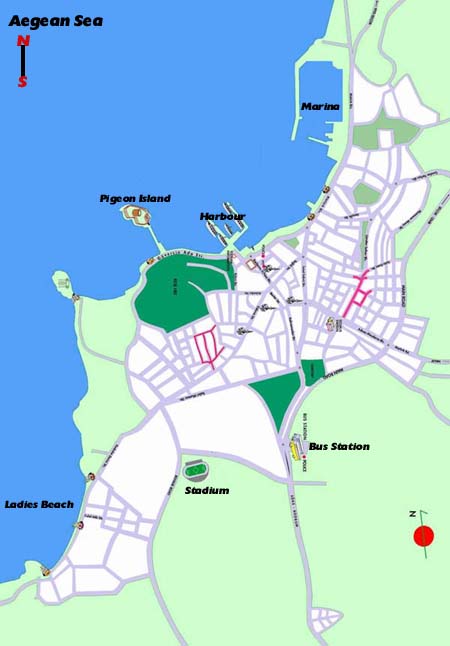
City Map of Kusadasi |
Kusadasi has a long history, it is believed to be at the site of ancient Neapolis. During the Byzantine era it was called Ania. It was taken by the Venetians and the Genoese who named it Scala Nuova. Later, it was predominately populated by Greeks who called it Νέα Έφεσος - Nea Ephesos (New Ephesus). Today it is a booming town, a major tourist area, complete with high-rise hotels. It is a most popular stop for cruise ships which disgorge hundreds of tourists into buses to visit two very important ancient sites Ephesus and Didyma which are only a few kilometers away.
We sat under the tent in a sort of daze. Inside the cabin the thermometer was reading 31° C (88° F). We hosed the tent and the evaporating water did cool it somewhat. We gathered some strength and walked to the showers. Everything in the marina was spotlessly clean and orderly. Later Muhtesem, the attendant, returned with our stamped passports and the transit log. What a contrast from the hassle in Greece! As we were in need of Turkish money, Scott and I walked a few blocks from the marina to an ATM machine. It did not accept my debit card but liked Scott’s. He was able to get 30 million TL at the rate of 438,000 TL to $1. No interest in the crew to visit Ephesus in this heat.
In the evening we all walked to town and at another ATM, I was able to get 100 million TL using a credit card because it too rejected my debit card. Have to get used again to being a millionaire! After a nice walk we found a wonderful roof restaurant near the water fountain on the main street. We feasted on an assortment of mezes (small morsels), Adana Kebab and chicken kebab accompanied by plenty of cold Efes beer. The night was cooler and pleasant. Back on-board I slept very well until I was woken up by the pain on my throat. Thus ends the first day of the adventure. This was the fourth consecutive night that I had trouble sleeping.
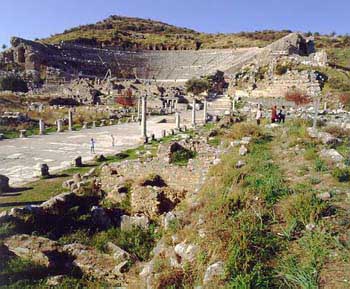
Ephesus |
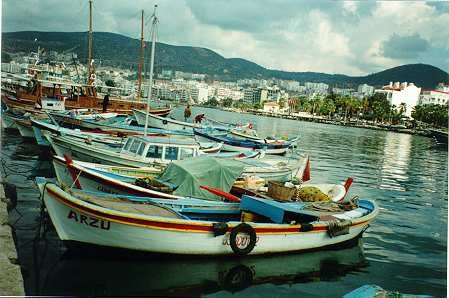
Kusadasi Harbor |
Wednesday July 14, 1999, Day 2
Although I thought that Turgut’s intentions were touching, I also thought that he should not really be paying our marina expenses, so I walked to the marina office and playing dumb asked for our bill. It was neatly printed: $20 for the docking fee, $30 for the transit log, and $20 for handling the paper work. Reasonable, other than that the docking fee is considerably higher than in Greece, 20 times higher. Of course, the services provided here are also considerably more and better. I received a call on the GSM phone from Manos Castrinakis, who will meet us in Ayvalik. Everything is on schedule.
We departed Kusadasi at 0900 heading for Gökkavar Limani. The wind was very light, 8 knots NW and to our nose. We motored and stayed under the tent up to cape Doganbey Burun (Ακρωτήρι Υψήλη). After rounding the cape, the wind came up suddenly at 25 knots NW with considerably higher gusts. In a hurry, we lowered the tent. The wind generator was turning with a fury making very loud noises but no current and would not respond to its switch and stop turning. This was its first test since the repairs in Samos, and it was very discouraging. I checked its fuse and it was OK. I had to conclude that despite all the efforts and expense it was not going to work. We lashed its blades and had at least peace and quiet. We raised the zodiac. The ride was uncomfortable as we were motoring against the wind and waves. There was some spray and some banging. Scott was not feeling very well and I gave him a sea-sickness pill from the first aid kit.
We arrived in Gökkovar Limani [38° 08.2' N 26° 36.8' E] at 1600, 37.6 M. The place had changed since our last visit here in 1993. Now there were at least 5 fish farms on the N cove. We decided to go to the E cove away from the fish farms. Already there was a Swiss catamaran anchored in the best spot. After a survey we decided to anchor W of the catamaran and take a line ashore. We anchored but it was about 16 m deep and by the time we launched the zodiac and prepared the shore line we had dragged our anchor. After two more unsuccessful attempts, we gave up and went to the N cove between the fish farms. We anchored securely at 7 m depth and took a bow line ashore. By this time we were all tired and my throat was killing me.
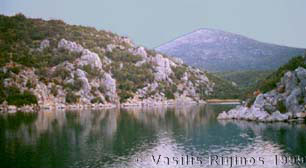
I called Turgut on the GSM phone; he will be expecting us in front of the Çesme Castle tomorrow around 10:00 AM. I decided to start treating my throat with antibiotics because instead of improving it has been deteriorating. Cynthia cooked a pasta with fresh tomato sauce. We all went to bed by 10:30. I had another bad night with my throat but managed to sleep more then yesterday.
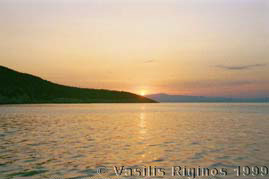
Thursday July 15, 1999, Day 3
I got up at 5:00 and started preparations for our departure. I wanted us to leave as early as possible so that we could avoid strong head winds and to be at Çesme around 10:00 as Turgut would be expecting us. As Cynthia and Scott also got up and helped with the preparations we were on our way by 0600.
The sea was calm and there was hardly any wind, nevertheless I was getting tired of all this motoring. My throat was still sore but maybe not as sore as yesterday. Time and miles went by slowly as the sun was rising treating us to a glorious sunrise. By 9:00, as I was getting ready to call Turgut and give him an update, he called to confirm that he will be waiting for us in Çesme. Right after we rounded Cape Akburun (Άσπρα Χώματα - Aspra Homata), he called again to tell us that he is on a hill and he could actually see us.
We entered the Çesme harbor [38° 19.6' N 26° 17.6' E] at 1050, having covered 30.5 M. The harbor has changed drastically since 1993. A whole new pier has been constructed to accommodate huge ferry boats that ferry cars directly from Italy. Inside the once charming old harbor, they are now constructing floating piers. A small charter fleet now has its home base here. Also, there are new roads and plenty of concrete. The old charm is gone. Turgut was inside a docked caïque waving at us. We tuned our portable VHF and spoke to him. What he wanted was to board Thetis and guide us to the Golden Dolphin Marina, on the other side of Top Burnu in the gulf of Ildir (Ερυθραία - Erythrea), where he keeps his sailboat New Life.
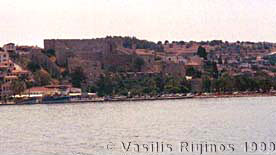
Çesme has a well preserved castle. It was built in the 14th century by the Genoese. Around 1400 AD, the castle was captured by Beyazit and enlarged by the Ottomans to protect the approaches to Izmir. Today it houses a small museum. Next to the castle are the ruins of a late (18th c) Ottoman caravanserai. In the harbor of Çesme the Russian navy destroyed the Ottoman fleet on July 5, 1770.
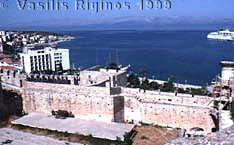
We approached the caïque and Turgut jumped aboard Thetis. After all the introductions, we left the harbor and headed N towards Top Burnu. Over a cup of coffee, we brought each other up to date. Today was a big day for the lovely Ayker children, Orhan and Delik. They were racing their dinghies. Turgut, took Thetis’ tiller and guided her through the tricky waters near Top Burnu. By 1245 we had entered the Golden Dolphin Marina [38° 19.4' N 26° 20.8' E]. Turgut had already hailed the marina on the VHF and we were expected by the attendants. This marina also is operated by the reliable Setur company. In no time, the attendants had given us a mooring line and tied our stern lines and we were docked. I think that I am getting spoiled by this kind of service!
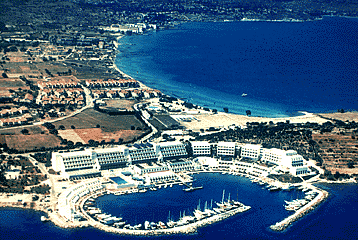
Arzu, Turgut’s wife, met us at the pier. She and the children were vacationing on New Life while Turgut commuted to his business in Izmir and joins them on Wednesdays and weekends. After washing up, we joined the Aykers aboard New Life which was docked just a few spots away from Thetis. They were anxious to watch the races. So, right away we cast off and New Life exited the marina. There must have been over 50 dinghies. We tried to pick up Delik’s and Orhan’s dinghies among the multitude. We watched Delik, expertly jibe her dinghy and overtake 3 others. Orhan, however, had very bad luck. During a practice session, a few days ago, his dinghy was damaged, so today he was using one of the oldest and slowest in the fleet. Despite his handicap he gamely persevered and continued racing. I found it very heart warming to see so many young people enjoying this noble sport with such enthusiasm and with such warm parental support. While we were watching, Arzu’s GSM phone did not stop ringing. Other children’s parents were wanting an update on the race and on their children’s progress. The Turkish government, too, is very supportive. They subsidize,with matching funds, the ownership of racing dinghies. The only string they attach to this support is that the dinghy must be sold within a yachting club. I contrasted this governmental and parental support with the pathetic situation in Samos where the tiny yacht club has only 3-4 boats, supported by private donations. Participation is low. During a recent race, I was told, only one parent went to see his child finish. This in an island of a country which for centuries has been living from the sea. What a shame!
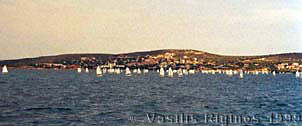
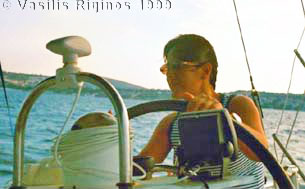
After watching the races for a while, we headed to the Hoteleratan Cove, just N of the Golden Dolphin Marina, where we anchored and swam. Arzu had prepared a sumptuous lunch with meat balls, pastas, salads, pickled peppers, etc. The afternoon went by very pleasantly and quickly. On our way back to the marina, we opened the genoa and sailed New Life downwind. She handles very well. We all had a marvelous time.
Turgut was very concerned about us sailing in Turkey this year. He thought that there were such very strong anti-Greek sentiments following the Öcalan debacle that we may be subjected to some harassment and other unpleasant treatment. He strongly advised us not to fly the Greek flag. I was very reluctant to remove our flag. Not only because international maritime law requires all vessels to display the flag of their country of registration, but because I felt strongly that by showing our flag we do not travel under any false pretenses but we are making a statement that the current political differences do not influence our friendship and our wish to visit our Turkish neighbors.
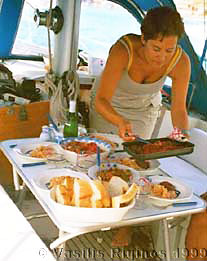
The feast |
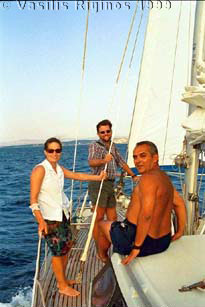
Cynthia, Scott, & Turgut |
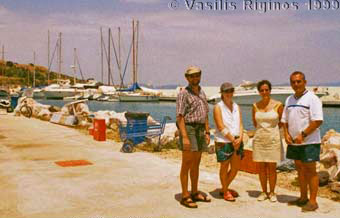
I tried to pay our marina bill but this time Turgut was way ahead of me. He had it pre-paid! After washing up and changing, we took a taxi to Çesme to pick up Turgut’s car. He then drove us around giving us a guided tour of the town and its environs. There are more than one million people living here during the summer months. Most come from Izmir but some also come from Ankara. He drove us to Agriler Liman and then to Dalyan where we linked with Arzu and the kids. Poor Orhan was totally exhausted from the races. We had a very nice dinner, at one of the sea-side restaurants specializing in sea-food, spiced with good wine and conversation. Finally, we drove back to the marina and said our good-byes to our dear friends as we would be leaving early in the morning. It was a long exhausting day but also very satisfying, filled with the warmth of friendship and Mediterranean hospitality.
Friday July 16, 1999, Day 4
This was the first night since we left that I slept without being woken up by the soreness of my throat. The antibiotics must be having an effect. I was woken at 5:00 by the alarm. I made my coffee and started departure preparations. We wanted to get an early start and avoid, if possible, strong head winds. The Navtex forecast had issued gale warnings for the Sea of Ikaria and was calling for “force 6 later 7” for the Northeastern Aegean.
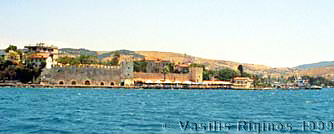
Our casting off went smoothly for a while. We dropped the mooring line but before we could gain any steerage way a sudden breeze drifted us towards a large motor cruiser that was docked next to us side-to. Our dinghy outboard motor which was secured on the railing, collided with their overhanging jet-ski. Fortunately there was no damage. We left the marina at 0600 heading towards Eskifoça. The wind, despite the forecast, was very light. We motored the 20 M to Cape Karaburun with a heading straight N. We were hoping that after rounding the cape and heading E, the wind might favor us and allow some sailing, but it was not to be. It, perversely, seemed to adjust to our heading and stayed at our nose. It was only during the last 12 M that we were able to sail with the full genoa while keeping the tent. The Navtex received a signal and printed it while we were motoring. The new filter seems to be doing its job.
We arrived at Eskifoça [38° 40' N 26° 45' E] at 1320. The distance from the Golden Dolphin Marina was 40.5 M. Again, things have changed since 1993. Before entering the harbor, Cynthia, strongly influenced by Turgut’s warning, asked me to remove our Greek flag. I did so but very, very reluctantly. There were now many more yachts, they use laid moorings, and there was an attendant. In, our case, however, although we hovered for a while, no one appeared. We decided on a berth, picked up the mooring (fishing it with the hook), and backed up. After we were secured and while deploying the passarella, a man on a motor scooter did appear and started talking to us in rapid Turkish. He did not seem to know any other language. Eventually we understood that he was directing us to move outside the harbor because we were tied on a berth that is used by one of the infernal gulets. I certainly did not like the idea of being outside the harbor, especially at a time like this when gale warnings were in effect. After lengthy negotiations, he reluctantly agreed that since we were to stay only one day, we could use another berth inside the old harbor. Under his direction, we re-maneuvered and we had some difficulty to avoid squeezing a small inflatable which was taking a good portion of the berth he told us to use. We strung an extra spring line to keep us from drifting towards the inflatable. I must say that this situation did remind me of Greece, not with nostalgia, where the coast guard never helps you moor but usually arrives after to tell you that you must move to another spot.
After all was set, and the passarella, once again, deployed, we all went ashore and walked to the attractive town. We found a small restaurant where we had a light lunch of pide (the Turkish pizza) and kefte kebab with cold Efes beer. We also bought a new Turkish flag to replace our old and worn-out courtesy flag. Later in the afternoon, while resting under the tent, we saw a fuel truck making a delivery to the patrol boat. As our own tank was almost empty, I walked to the truck and with some difficulty (the driver spoke Turkish and Bulgarian) negotiated, with the help of one of the patrol boat sailors who spoke French, a fuel delivery to Thetis. The driver seemed rather reluctant but he did come. His nozzle’s diameter was too large for our intake and its shutoff valve had no handle, it needed pliers. I adjusted it for a slow flow, and started filling our tank. We took about 80 L. It was hard to tell when it was getting full. The driver paid no attention to my calls to shut-off the pump and it took me some time to turn the valve with the pliers. As a result, about one liter of fuel spilled over. We were all, except the driver, very upset to have polluted this lovely harbor.
Eskifoça is the ancient Φωκαία - Phocaea. It is believed to have been founded by colonists from Erythrea and Teos in the 8th century BC. Phocaea soon became an important trading center and its fifty-oared galleys roamed from the Black Sea to the Western Mediterranean. The Phocaeans were great navigators and founded many colonies in the Black Sea, the Bosphorus, Italy, and further west. They were the founders, among others, of Massalia (modern Marseilles in France), Tartessus (near Cadiz in Spain), Alalia in Corsica and Velia in Italy. Phocaea was taken by the Persians from whom they were liberated by Alexander the Great. In the Hellenistic times they sided with the Seleucids against the Romans who captured and looted their city in 190 BC. During the Byzantine era the city declined although it was the see of a bishop. In the Middle Ages Phocaea was occupied by the Genoese who mined alum, used as a dye in the tanning business. Finally the city was captured by the Ottomans in 1455.
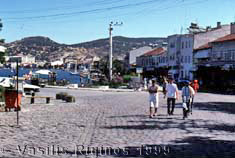
In the evening, while Cynthia and Scott were taking a walk, I received a phone call on the GSM from Manos Castrinakis. He and Mary were already in Lesvos having arrived today from Athens. There was a difficulty. The ferry boat from Mitilini to Ayvalik did not operate on Mondays, as earlier scheduled. They had trimmed the schedule because there were not so many passengers. The only day that it was “guaranteed” to run was on Thursday. This was terrible, because our plan was for Cynthia and Scott to take the ferry boat on Monday, stay for two days in Lesvos, and fly back to Athens on Wednesday, in time for their flight back to the US on Thursday. So a Thursday ferry from Ayvalik will cause them to miss their flight from Athens. Also, if the Castrinakis were to arrive on Thursday, our sailing from Ayvalik would be considerably later then our plan and we would be late in Istanbul where we were to meet with Andonis Ephremides. The only other alternative was a ferry boat that “may” run tomorrow, departing Mitilini at 0800 and again departing from Ayvalik at 1700. It would take us an overnight of hard sailing to get to Ayvalik by that time. Manos promised to make further inquiries and call us back because I was not about to leave Eskifoça in a hurry without first being certain that the ferry would run tomorrow. The other alternative would be for us to sail with Thetis to Mitilini. The problem with this alternative was that we would have to check out of Turkey, check in Greece, check out of Greece, and then check back into Turkey in Ayvalik paying $60 more for a second transit log. After some reading of Heikell we determined that if we were to follow this last alternative we would not need to go all the way to Ayvalik but we could check out of Turkey in Dikili which is right across from Lesbos. The prospect of having to go through the bureaucratic hoops 4 extra times, however, left me totally disenchanted. I even entertained the thought of sneaking into Greece and dropping Cynthia and Scott and taking in Manos and Mary. This would have been feasible for Cynthia, Mary, and Manos who have Greek passports, since these are not stamped in Greece. But Scott’s passport had an exit stamp from Greece and a later entry stamp from Turkey. Without a current Greek entry stamp he could run into trouble at the airport when he would be leaving for the US. Sneaking out and in Turkey was, of course, out of the question because I wanted the boat papers to be completely proper, at any rate Manos and Mary would need Turkish entry stamps in their passports. Weighing all these options, we decided to swallow the bitter pill and head for Dikili.
While we were preoccupied with these difficult choices, we heard a loud roar from the shore. It was coming from a truck which was fumigating the harbor. Before we could do anything sensible we were enveloped in a thick cloud of insecticide. It covered everything, our towels and all our clothes. Scott was indignant. “I don’t believe this! How can they do this? Don’t they realize how harmful it is to humans? How about all the people eating at the waterfront restaurants? Their food is poisoned!”
Morale among the skipper and crew of Thetis was low this evening. While we were relieved that we had made up our minds on how to deal with the crisis, we were not pleased with the new plan that called for time spent with bureaucrats rather than in wonderful coves and lovely towns. We were also very upset for being sprayed by who knows what harmful substance. We put in a call to Manos and explained this change of plan. We will be checking out of Turkey on Sunday and sail to Mitilini from where we will be leaving for Ayvalik on Monday morning. He seemed pleased to be picked up in Mitilini. I must say that today I was glad that we have the GSM phone, without it Cynthia and Scott would have missed their flight from Athens next week. We had dinner ashore, pide and donner kebab.
Saturday July 17, 1999, Day 5
I slept fairly well. The antibiotic had done the trick with my throat. I was woken up early by the wind. We should have left right away but I felt kind of lazy and I did not want to wake up the kids. By the time we were casting off it was 0725. There were strong gusts, over 30 knots from the ENE right into the bay. Out at sea, the wind was less gusty and was a more steady 20 knots NE. The waves were fairly large, confused, and on our nose. We motored uncomfortably with some spray averaging no more than 4.5 knots at 2500 RPM. Slowly, we made our way to our destination for the day, Bandemli [39° 0.07' N 26° 47.9' E] where we arrived at 1240 after 25.7 M.
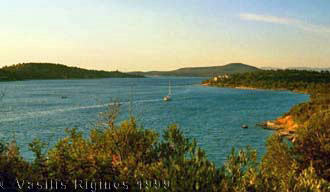
Inside the cove, between the mainland and the first island, it was very calm and quiet. We anchored on sand and on our second attempt at 4 m, the anchor held firmly. Since 1993, at least one fish farm and a very large expensive house have been added. Other than that, the cove is as I remembered it. After jumping in the water to cool off, we put up the tent, had lunch, and we all took a nap.
After our nap, we swam and snorkeled. The water was very clear and teaming with life. Later, we went ashore to look at the hot springs. There were several people soaking in the hot mineral water. We joined them inside the little bathhouse. They were very friendly. As we were getting ready to get into the zodiac to go back on Thetis, we noticed a small boat with a family of 2 men, 2 women (in traditional Moslem costume), and a little girl rowing frantically while trying to start their outboard motor. We gave them a tow ashore. While Cynthia and I went back to Thetis, Scott stayed with the family and engaged them in a conversation. They invited us all for dinner to their vacation house which was near by. I declined, because although it is always rewarding to meet local people, I was reluctant to move Thetis from this very secure shelter.
We prepared our supper of pasta with tuna fish and capers. The Navtex forecast was not encouraging. They were issuing a gale warning for the NE Aegean. Maybe we will not be sailing to Mitilini tomorrow.
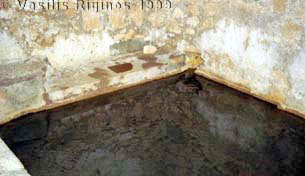
The Hot Spring |
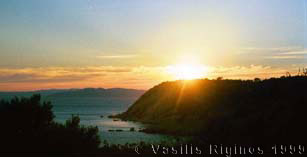
Sunset |
Sunday July 18, 1999, Day 6
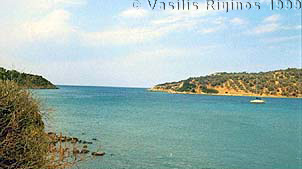
What a day! Nothing worked quite as planned, and yet…
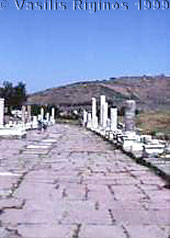
All night, the wind howled with many gusts exceeding 30 knots, even inside the cove. This together with the gale warnings which continued to be received on the Navtex made me decide to stay for the day in Bandemli. I did not wake up the kids and I let them enjoy their sleep. Cynthia woke up first and we sat together at the cockpit sipping our coffee while Scott slept. We also called Manos and told him of this new change of plans. After Scott woke up too, around 9:00, we all decided to go ashore for a nice walk. In the mean-time, the wind had diminished. We got into the zodiac, landed, climbed up the hill and started walking following the dirt road which presumably led to the town of Bandemli. While walking we all noticed that the sea was calm. After some discussion we came to the conclusion that the gale was not going to materialize and we would not have any difficulty going to Dikili.
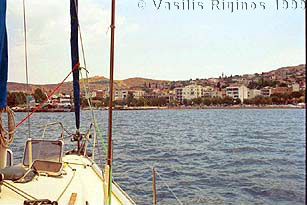
According to Heikell, there is nothing to recommend Dikili other than its proximity to Pergamon (Bergama in Turkish) which is only 28 km away. It is an industrial harbor frequented by cruise ships.
We got back aboard Thetis and raised the anchor at 1115. We motored the 7.3 M to Dikili [39° 04.1' N 26° 53.1' E] without encountering any bad weather and by 1230 we were in the harbor. As described by Heikell the entrance of the harbor is hard to see. It it is a large, ugly commercial harbor, but it was not as crowded as he led us believe. As soon as we entered, there was a man indicating to us where to berth. We dropped the anchor and came stern-to without any difficulty, as there were at least two other men ready to receive our stern lines. Since we did not plan to stay here longer than it would take us to clear the formalities, we arranged our position close to the quay thus avoiding to deploy the passarella.
As soon as we were secured I asked where the Harbor Master’s office was located. The man told me that the office was closed, today being a Sunday, and that it will open tomorrow at 9:00. Great! We were crestfallen. All our plans were upset. It looked that either we were to spend the day in this not so pleasant place or we had to push on to Ayvalik. The former was particularly hard to swallow since we had just come from such a lovely place, the later was not pleasant either since we had just wasted a couple of hours by getting here. Well, we decided to go to Ayvalik after all, but first to have a bite to eat here and to buy a few bottles of spring water.
While walking along the waterside restaurants I noticed an official looking office with several men inside. It had the look of either a customs or a police office. On an impulse, I inquired about the Harbor Master. A tiny man spoke some English and informed us that this indeed was the passport control office and that we could get cleared out of Turkey today, but after 3:00 PM when the harbor master will return. So, after thanking him, we said that we shall return after lunch and before 3:00. While we were still trying to make up our minds at which establishment we were going to have lunch, our little man found us, and, out of breath, told us that the Harbor Master was already back and if we hurried he could clear us right now! Since we had with us neither the passports nor the ship’s papers, we hurried back to Thetis to get them. I forgot to mention that it was a very hot day.
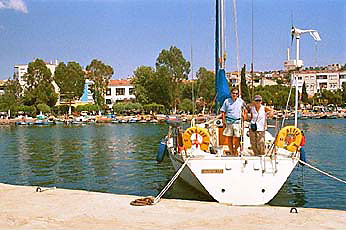
After getting all the papers we ran to the passport office. Our man asked us to follow him. He walked very briskly. I followed. Cynthia and Scott followed me. Thus we walked under the hot midday sun for several blocks, eventually arriving at the Harbor Master’s office. The Harbor Master did not speak any foreign languages but there in his office was a young man who spoke English fluently with a strong Australian accent. He was born and raised in Australia, but came back to Turkey with his parents about a year ago. He was employed as an agent for a 6,000 ton cargo ship. The Harbor Master’s office is normally closed on Sundays, but since the cargo ship needed to be cleared for her departure tonight for Italy the Harbor Master was putting in some overtime. We explained to him our predicament, and the reasons why we wanted to leave Turkey (our transit log was for Trabzon) and get to Mitilini today. He translated to the Harbor Master, listened to him and translated back to us. It seemed possible to retain our current transit log, but he would have to look up some regulations. After some more questions he understood that I was going to pick-up two new crew members at Mitilini. He then said that he was sorry but we would need a new transit log after all. All this was not very clear, as there was plenty of confusion, between English, Australian, Turkish, and Greek exchanged rapidly between the Harbor Master, the agent, the tiny man, and ourselves. At any rate, the Harbor Master wrote and stamped on our transit log and then moved himself to another office. In the new office, he gave us a form to fill out and left. We did so and waited. After some time the Harbor Master returned, turned on an old PC computer, and started typing with one finger. He was very serious! In the fullness of time he pressed a key and a nearby printer started spiting out paper. He took the printout and scrutinized it for at least five silent minutes. Everyone was holding their breath. At last, he signed and stamped the printout as well as a number of other forms. The whole process was conducted in a serious but friendly manner and took a little over an hour.
We emerged from the Harbor Master’s office. Our little man was holding the newly stamped old transit log and various and sundry other forms as something extremely precious. He beckoned us to follow. On we went, the little man led, followed by me, followed by Cynthia, followed by Scott. We did not actually walk too far, but, to our surprise, he did not lead us to an office but to a cafe. He asked us to wait and he entered the cafe, with all the forms, and engaged in a very animated conversation with another man. After waiving all the forms at him, our man seemed to prevail. The second man slowly rose from his seat and followed our man outside the cafe. He then looked our passports and the animated conversation continued for another ten minutes at the end of which our tiny angel declared that we need to go to the police.
Our leader started marching again, and we once again followed in the heat. By this time we had begun to wonder. Again, to my surprise, he did not lead us to the passport police where we first met him but to a large police station. He engaged in another long discussion with one of the machine gun toting guards. He then told us to wait and he left us walking in the direction of the harbor. The guard, waiving his machine gun in a friendly sort of way, indicated a bench under a tree, and smiled. We, with some relief, sat under the shade and waited for what seemed like hours. To our delight our man did come back and beckoned us to follow. The procession arrived at the original passport control office next to the harbor. He talked to a man, and led us to another nearby small building. The new man took our passports and scrutinized them. He was rather confused because my passport was in the name of Riginos and Cynthia’s in that of Riginou (the possessive of Riginos). After the confusion was cleared, he produced the magic stamp and stamped all three passports with great flair.
Our tiny man, once again, asked us to follow. This time, he led us to a totally different place. It was a long, hot way, and with my empty stomach, I was getting rather dizzy. We were met at this new office by our old friend from the cafe. He was now all business. He was the “customs” officer, he took one form, placed a stamp on the transit log and indicated us to go to yet another office, this one blissfully next door. It was the “customs patrol” office. The new official behind the desk, took our passports, scrutinized them, stamped the transit log, canceled the entry of Thetis in my passport, stamped yet another form, and gave me the original computer printout from the Harbor Master, now decorated by several stamps and signatures. It title was: “Permission to Sail from Dikili to Midlin.” We were through, at least for today, with Turkish officialdom. It all took less than 2½ hours! We thanked our tiny man profusely and gave him a handsome tip which, after some persuasion, he reluctantly accepted. We said our good-byes.
It seems I was not the only starving member of the Thetis crew. None of us could face sailing with our empty stomachs. We went to a restaurant and had some beer and tasty food. Scott treated us to dandurma, the wonderful Turkish ice cream.
Back on board, we cast off at 1540 leaving Dikili and heading for Lesvos. I found in Heikell an attractive sounding cove about 4 M north of Mitilini where we could spent the night. The idea was to enter Mitilini harbor tomorrow morning and deal with the authorities for both our arrival and our departure at the same time, thus keeping bureaucratic contact time to a minimum. Before proceeding on our way we stopped just outside Dikili and all three of us jumped into the water for a much needed cooling. The sea continued to be very calm and the wind just the mildest of breezes. But as we went further out of the Gulf of Dikili it picked up to 20-25 knots NNE which allowed us to have a pleasant sail with the genoa - we were too hot to remove the tent.
We arrived at the cove of Panaria [39° 09.6' N 26° 32.1' E], Lesvos at 1835, after 18.5 M. We anchored without any problems. The cove was calm and pleasant, despite an old abandoned factory and a nearby garbage dump. We took showers and a much needed rest. Just as we were getting ready for our evening ouzo and to admire the sunset, the wind increased suddenly in strength and it veered from the E bringing large waves, too large for staying comfortably where we were. We quickly raised the anchor and looked for a more secure spot but to no avail. All places that promised better protection from the E were too shallow. I reluctantly decided that the most prudent course would be to head for the Mitilini harbor.
We left Panaria at 2030. The waves by that time were sizable. We covered the 5.4 M and arrived in Mitilini [39° 06.1' N 26° 33.6' E] at 2115. It was already dark. We circled a little to determine where to go. After we decided to dock side-to at a certain spot, we prepared the fenders and the docking lines, and made our approach. As Cynthia was getting ready to jump to the quay, a uniformed member of the Greek Coast Guard (Limenarchio) made his appearance. Instead of helping by catching our line, he directed us to another spot about 10 m away from where we intended to go. No explanation for this was offered nor could one be deduced as no other boat used that spot till the morning when we left. Again, he offered no further assistance. We docked smoothly, with Cynthia jumping ashore and tying our lines while the officer watched. As soon as we tied, he asked from where we came from. When he heard that we just arrived form Dikili, Turkey he went ballistic. He immediately said that we had to move to a secure and designated area within the customs fence, have our passports stamped, and clear customs. I was reluctant to move the boat again for the third time. Not only was I very tired and hungry, but I strongly suspected that none of these officials would be at their offices at this late hour. Also, I still hoped to handle both checking in and checking out at the same time. I politely explained all this to the officer and he promised to speak to his superior and come back with further instructions. He walked away. While tidying up the boat we turned on the VHF and tuned it to channel 12 which is used by the Greek Coast Guard. We heard our officer friend talking to someone about us. His correspondent was adamant: we had to go to the customs area right away. He came back with the bad news. I asked him if I could at least walk to the customs, and survey the area we were to dock and also to ascertain that the officials were there to receive us. He agreed. He also advised me that in the event the officials were not there to go to the Limenarchio office and talk to the officer on duty. Maybe he could authorize us to stay for the night where we were. Cynthia and I did walk to the customs area, and, of course, no one was there, all offices were hermetically shut. On our way back we stopped at the Coast Guard office and spoke to the duty officer. After we explained to him the situation, he agreed that it would be silly to move the boat tonight to the deserted customs area. As long as we promised to do so first thing in morning, as far as he was concerned we were allowed to stay where we were. Also, he saw no reason that we could not go to a nearby restaurant and have a bite to eat. We did so and went back aboard to sleep.
Total distance from Pythagorio, Samos to Dikili and Mitilini, Lesvos 227 M in 35.08 travel hours.